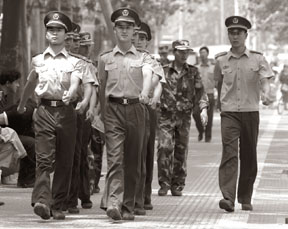|
dailynews |
|
|
|
|
|
OTHER LINKS |

|

|

|
The roots of the US - North Korea nuclear stand-off
In the latest unsettling salvo directed at the US, North Korea is on record that it would retaliate with an "annihilating strike" on the US if the latter resorts to a pre-emptive military strike against it. "The army and people of the DPRK are now in full preparedness to answer a pre-emptive attack with a relentless annihilating strike and a nuclear war with a mighty nuclear deterrent", a North Korean Central News Agency report said. The immediate backdrop to this dire warning were allegations of a steady US military build-up against North Korea. War exercises and aerial surveillance in collaboration with South Korea, were cited as two significant features of these hostile manoeuvres by the US. Earlier, North Korea suspended participation in the six party talks on the North Korean nuclear issue, which also featured the US, China, South Korea, Japan and Russia.
The move may be considered a snub to the US which has for quite some time trying to extract the conformance of North Korea to the current nuclear non-proliferation regime which is seen as inherently discriminatory by some of the world's nuclear powers which are not members of the Western military alliance or NATO. The US confrontation with North Korea comes close on the heels of its nuclear dispute with Iran, which along with Iraq and North Korea, were labelled by US President George Bush as being the principal components of an "Axis of evil". In all such disputes the US could be said to be seeking "the complete and verifiable elimination" of the nuclear programs of the states concerned, regardless of the real intentions of their creators. The point need hardly be stressed that the roots of these confrontations lie in the current global power structure. The West would not consider worrisome, states which are considered its proxies and allies coming into possession of a nuclear capability but would strongly resent those states which are seen as posing a threat to its interests, arming themselves with nuclear arsenals or with nuclear facilities of a non-military orientation. In the case of Iraq and Iran, it is their location in a oil-rich region which is causing the West considerable concern. The US-led military incursion of Iraq could very well have been aimed at strengthening the US presence in the Persian Gulf region and South West Asia. These same considerations apply to Iran. However in the case of North Korea, ideological and Realpolitik considerations come more to bear. The US would chafe at the presence of a nuclear-armed, communist power in close proximity to US allies, South Korea and Japan. South Korea in particular has been instrumental in stemming the influence of communist North Korea in the Far East. Besides, Japan and South Korea have been exemplars of capitalist-driven development in the region which showcase the virtues of free enterprise. For these reasons, the West reasons that North-Korea needs to be contained and brought to heel militarily. A nuclear-armed North Korea would certainly undermine the power balance in the Far East which is tilted in favour of the West. |
 NUKE ISSUE: The US - North Korea war of words on the nuclear issue,
once again highlights problems inherent in the current global nuclear
non-proliferation regime.
NUKE ISSUE: The US - North Korea war of words on the nuclear issue,
once again highlights problems inherent in the current global nuclear
non-proliferation regime. 







